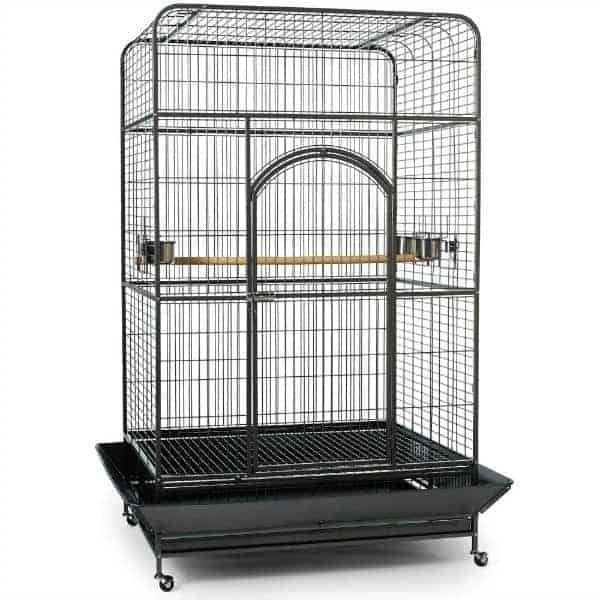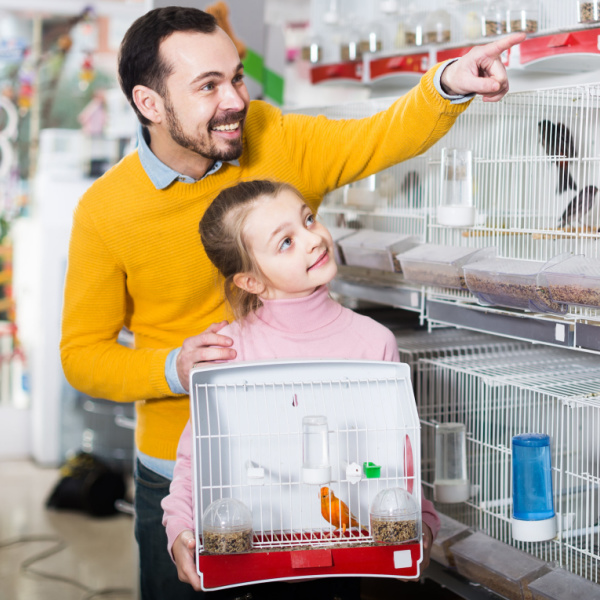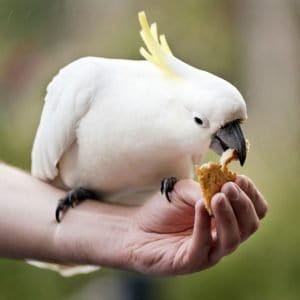Last Updated on by Mitch Rezman
Kirstin B. relates
Hi,
I have a blue and gold macaw parrot. He has been in the family since he was a baby. Sadly my great uncle was the one who got him and died shortly thereafter.
He has gone through 2 other family members until sitting with me and my dad.
My dad got him about 20 years ago and my dad was so good with him.
Unfortunately in the past 5 years, my dad has had a lot of issues with the bird.
The last year I have pretty much taken over the bird however I will be leaving the house in about a year and a half for college.
I would like to have the bird in the best state possible and have my parents really comfortable with the bird.
So far the bird is only comfy with me as of lately.
My parents have low tempers with him which they are working on.
I just want the best for the bird and would love some tips you could give me to help him feel cozier with my parents.
Catherine replied
Kirstin – Kudos to you for trying to keep your family’s Blue & Gold with your family. Sounds like he is about 22-25 and may live another 20-25 years.
How old are your parents now? Guessing 50’s?
With the proper arrangement, the B&G could live with them successfully however it will not be without an effort from everyone.
It is common knowledge that these birds really do enjoy the company of younger folk, including children. I know of many who own them and find that the smallest family members are often the favorites of the birds. The B&G can feel your youthful energy and thus is drawn to you.
Your parents are not as active and as such, not as interesting. Larger birds like yours can act out on their frustrations and end up causing their caretakers to pull back more which only adds to the bad behavior.
What should help is making sure the right equipment is there for the bird and your parents so they can best carry on without you when you go to college.
A very large cage would be a requirement. The bird must have a large enough enclosure to allow it to be inside without being cramped.
Something like this is best. It will allow for a multitude of swings, perches, toys, and room to flap its wings, and if required to be kept caged for more than a day no worries.
Flat Top Bird Cage for Large Parrots by Prevue 3157 Silverado Black
Then a good play stand, or more, depending on the layout of their home.
If they are in different rooms, so will the bird want to be so a play stand in most family-used homes will be appreciated.
Living room, family room, the office, the kitchen, etc.
Without a parrot-designated stand in each room the bird is then set on a chair or a table or the top of the door, where they can do damage to it and thus get into trouble.
Not a good way to develop the best bonds with your parents.
We recommend developing a daily schedule for the bird.
A bird can’t tell what day of the week it is, but it can tell what time it is.
So, for example, if your bird is in its cage in the morning and wakes, it may likely call out for you or someone to come let it out.
Well, if it is at different times, the bird is likely to keep calling over and over hoping that someone will show up.
If the bird is always let out at the same time, it is less likely to call as loudly, or as frantically as one who knows that his time is coming and maybe calmer.
And be willing to sit and play quietly in its cage until it is time to be let out.
A schedule should be set up for when the lights go on when breakfast is served when the door opens when they are taken out and put on a stand. When an afternoon snack is delivered, dinner time, playtime, bedtime, whatever.
If your parents seem to be only caring for the bird due to family obligations, or they are becoming infirm and it is a hardship to keep the cage clean, or they really are not enjoying having the bird around, then you may want to look into rehoming the bird before you go off to college.
I hope this helps you make the right decisions for the bird and your family.
Kindest regards,
Catherine
Author Profile

Latest entries
 Bird & Parrot CareJune 20, 2025Understanding the Best Way to Use Prevue Pets Mimic Me Voice Trainer
Bird & Parrot CareJune 20, 2025Understanding the Best Way to Use Prevue Pets Mimic Me Voice Trainer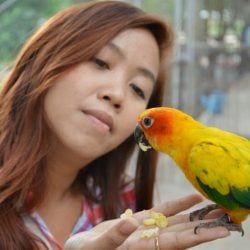 Bird BehaviorJune 6, 2025How Do I Keep My Parrot From Dumping His Food Every Day?
Bird BehaviorJune 6, 2025How Do I Keep My Parrot From Dumping His Food Every Day? Birds & LightingMay 16, 2025I Am Seeking Clarity About Lighting for My Birds Cage
Birds & LightingMay 16, 2025I Am Seeking Clarity About Lighting for My Birds Cage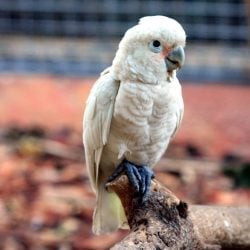 Bird RescueApril 29, 2025How Do We Re-Home a 17 yr Goffin Cockatoo?
Bird RescueApril 29, 2025How Do We Re-Home a 17 yr Goffin Cockatoo?

